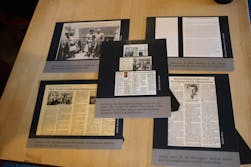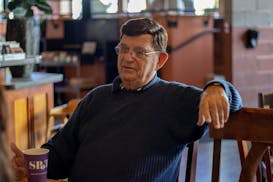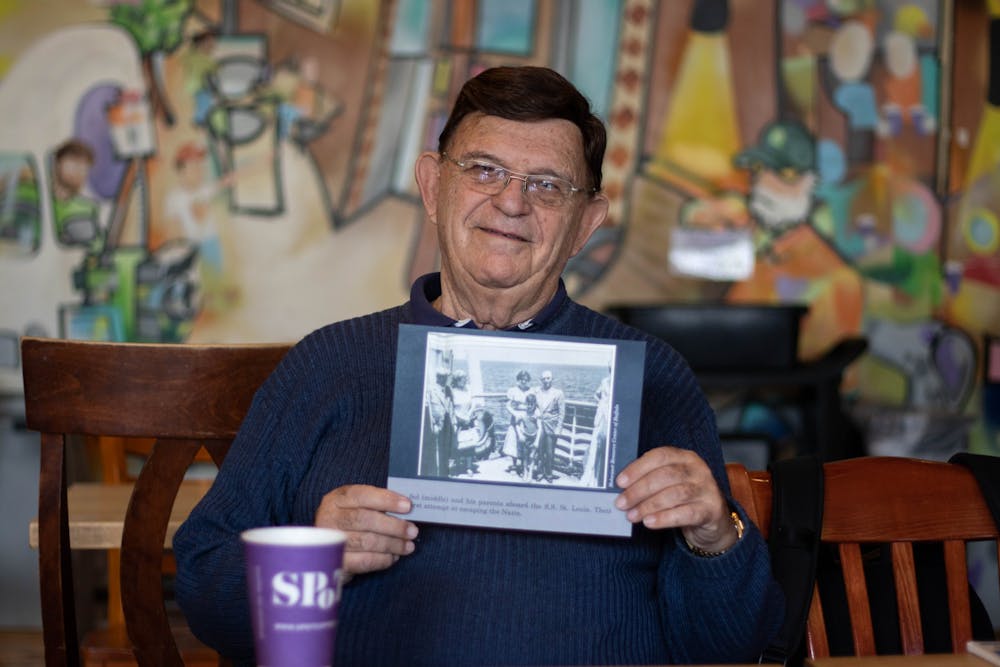To a stranger, Sol Messinger seems like an average Buffalo local.
He passes the time by meeting with his friends, reading the Wall Street Journal and routinely walking to Spot Coffee to start each of his mornings.
To the barista, Messinger is simply another regular who orders the same thing every day: black coffee (no cream, no sugar) and a small slice of coffee cake.
But he’s more than just a retiree with a routine. Messinger is a Holocaust survivor who’s dedicated himself to advocating for the Jewish community and spreading awareness about anti-semetism.
At 90 years old, Messinger is one of a shrinking group of living Holocaust survivors. There are fewer than 50,000 Holocaust survivors left in the U.S., according to The Atlanta Jewish Times.
Messinger, a former UB student and emeritus professor of medicine, is featured in the ongoing PBS documentary “The U.S. and the Holocaust,” which began airing Sept. 18.
He keeps history alive by continuing to go to schools and talk to students, sharing his pictures and memories with Holocaust Museums, and staying actively involved in Buffalo’s Jewish communities.
Last week, he sat down at Spot Coffee for an interview with The Spectrum.
“I think about everything that happened and I don’t know how I feel,” Messinger said. “It was a long time ago, but I remember it well.”
In October 1938, Messinger and his parents were among the many Jewish-Germans rounded up by German police and sent to an internment camp not far from the Polish border.

Messinger’s family had applied for visas to the U.S. a few years before but were still on the waiting list at the time. Needing to escape Germany, they managed to obtain visas to Cuba. But in 1939, after traveling across the Atlantic to Havana on the MS St. Louis with 900 other Jewish refugees, the Cuban government refused entry. The ship and all of its passengers, including Messinger and his parents, were sent back to Europe to face persecution.
“A lot of my earliest memories were on that ship,” Messinger said. “My parents were worried, I could tell, but they tried to shield me from it. We were docked outside of Cuba for seven days. People pleaded with the Cuban government to let us in. They responded by sending people out on small boats to round up any passengers trying to escape.”
Messinger was only six years old at the time he boarded the MS St. Louis. He was forced to celebrate his seventh birthday on ship, while his family’s future was left in the hands of the Cuban government.
Messinger eventually met another boy his age on the ship, and they soon became friends.“It was lonely at first,” Messinger said. “I was grateful to have someone to play with. He made everything a little easier.” After Messinger and his family were denied at the Cuban border, the MS St. Louis returned to Europe. But Messinger’s friend was sent back to Auschwitz.
“He probably died there,” Messinger said. Messinger and his parents lived in Belgium before fleeing to France for refuge in 1940. In France, they were arrested and sent to an internment camp in Agde along with other Jewish refugees.
Sleeping on beds of straw, he remembers sleepless nights, waking up cold and covered in rashes.
“I spent most of that time clung to my mother because the men were separated from the women and children,” Messinger said. “Eventually, one of the other refugees told my mother we had to escape. And somehow we did.”
Messinger, who suffers from memory loss, couldn’t recall exactly how he and his mother escaped the internment camp, nor how his father managed to do the same. He was shocked to run into him one day, assuming he suffered the same fate as so many other Jews during the Holocaust.
“One morning, my mother was out at the water pump and she saw my dad running down the hill towards us. He had gotten out,” Messinger said. “It was one of those moments that felt like a miracle.”
After being reunited with his father, Messinger and his family went to Marseille, where they managed to obtain the necessary paperwork to move to the U.S. Messinger’s father had family living in Buffalo.
That was 80 years ago. He’s lived there ever since.
“You don’t live somewhere as long as I have if you don’t love it or the people,” Messinger said. “I enjoy Buffalo.”
Although Messinger has a love for Buffalo now, leaving behind his entire life was a transitional period for him.
“When I first arrived here, they put me in first grade, even though I was about fifth-grade aged,” Messinger said. “This is because I knew practically no English. I don’t remember being scared though, just thankful.”

Sol Messinger starts every morning with a black coffee and a slice of coffee cake from Spot Coffee.
Messinger says that after only about five weeks, he managed to work his way up in school and was placed in normal-level classes. His father, a tailor, was able to find a job and his mother picked up part-time jobs cleaning for families in the area. They had made Buffalo home.
“I don’t remember experiencing any anti-semitism after coming to the U.S., especially once I started attending UB.” Messinger said. “Most of my friends were also Jewish.”
Messinger graduated from the Jacobs School of Medicine with a degree in pathology and eventually went on to teach medicine at UB.
“I’m very thankful for my time at UB,” Messinger said. “I couldn’t tell you why I decided to study medicine — maybe because it’s what all my friends were doing — but I’m glad I did it.”
Although Messinger has since retired, teaching continues to play a huge role in his life. He is an active member of the Buffalo Jewish Federation and spends a lot of time sharing his stories with students.
“It’s the most rewarding thing I can do with my time, otherwise today’s kids would never understand,” Messinger said. “I like to remind everyone that these things happened, and people still remember them.”
Kayla Estrada is an senior news/features editor and can be reached at kayla.estrada@ubspectrum.com

Kayla Estrada is the opinion editor at The Spectrum. She is an English major who enjoys rainy weather, “Bob’s Burgers” and asking people who they voted for. When she’s not writing, she can be found hunting for odd-looking knick-knacks at the nearest thrift store.





